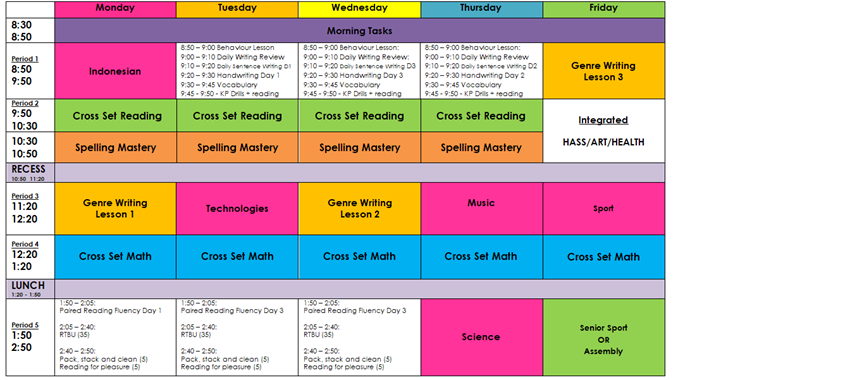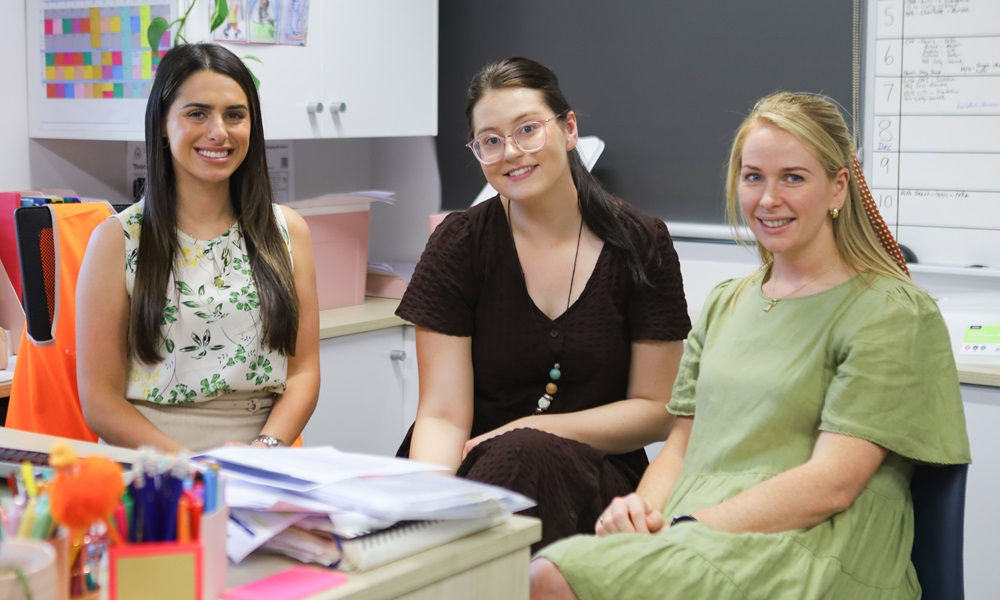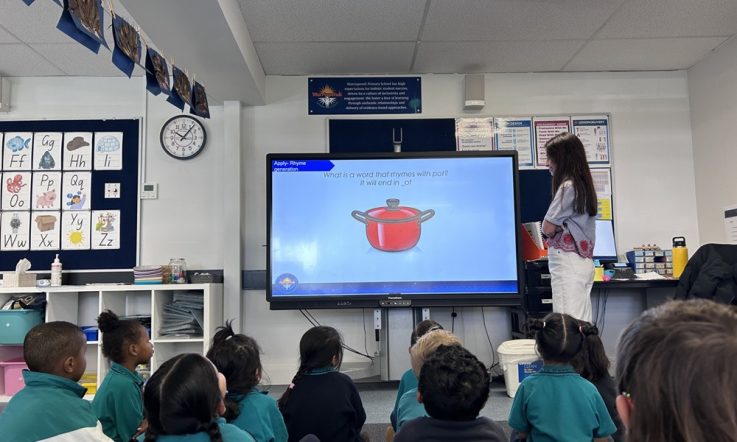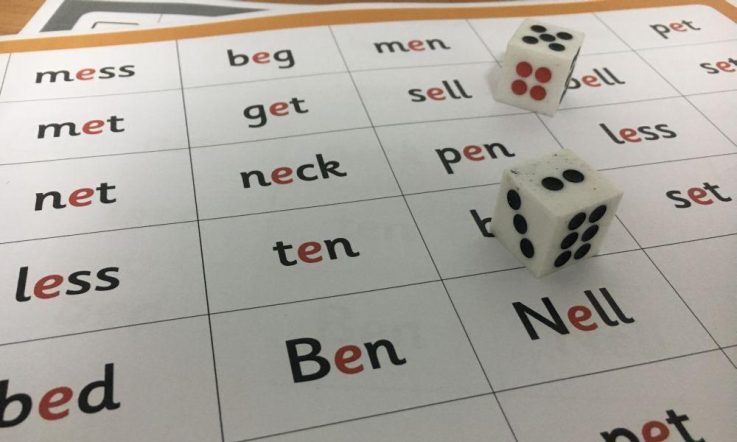At Warriapendi Primary School (WPS) in Perth, Western Australia, the leadership team has been on a journey to build instructional capacity to lift student outcomes since Principal Matt Pinkard joined in 2022. In a 3-part series for Teacher, Pinkard and Associate Principals at WPS, Deann Jones and Roxanne Righton, share what’s happened so far and the progress they’ve made in literacy instruction. In part one, the team discussed how they’ve cultivated a positive school culture to lay the foundation for building instructional capacity. In this second article, they share what they’ve implemented so far to build staff instructional capacity, and how they keep momentum.
Building instructional capacity is a critical element of our ongoing school improvement agenda. As with any change process, there are risks of an implementation dip and instructional drift. Even the most structured and well-organised program can end up being strayed from over time without regular check-ins and revisiting of norms.
Codifying our practice and the agreed structures for Literacy and Numeracy blocks was critical in the early stages of our school improvement journey. Without a clear picture of expectations and norms, an instructional coach is likely to be less effective.
In the last article we spoke about shifting the focus of staff meetings to a balanced structure that includes both Phase of Learning Team (POLTs broken into K-2, 3-6 and Specialist) and whole-staff meetings. Staff were provided with our spine of professional readings, such as John Hollingsworth and Silvia Ybarra’s Explicit Direct Instruction (2017), Doug Lemov’s Teach Like a Champion (2023), and Ollie Lovell’s Tools for Teachers (2022). Chapters from each of these, and other texts, are focused on during POLT and staff meetings as we dive deeper into best practice and instil a strong understanding of the why.
Using instructional coaches to support teacher capacity
One way we ensure consistency school-wide at WPS is through the recruitment of highly skilled instructional coaches – what we refer to as Impact Coaches. At our school, the role involves:
- Supporting staff to deliver Literacy and Numeracy blocks with fidelity
- Designing and delivering professional learning for staff
- Using data to drive innovation in collaboration with the leadership team and POLTs
- Modelling best practice in their own classroom
Our current Impact Coaches, Shani Bhoday and Alison Boag, are backed by clear documentation that articulates what our coaching model should look and feel like for our teachers, ensuring there are no surprises along the way. School leaders regularly meet with the Impact Coaches to provide support, discuss trends in data sets, set future directions, and identify areas of need for further focus across the school.
Impact Coaches also support the team via resource/lesson creation and co-planning. They go beyond the traditional method of coaching to strike a balance between facilitative, dialogical and didactic coaching. They have been trained in and follow Jim Knight’s Impact Cycle model (2017) – which has 3 stages: identify, learn and improve – focusing more heavily on dialogical coaching to provide greater autonomy for the teacher.
Visible leadership
In an effort to avoid implementation and instructional dips, school leadership team members are highly visible throughout each school day. We are frequently in classrooms highlighting strengths and identifying opportunities for improvement and growth. The power of having a leadership team that cannot only identify key elements within lessons that are/aren’t having the desired impact, but also then follow this up with effective modelling through teaching or co-teaching, is enormous.
Staff are regularly released to observe one another in action, providing opportunities to learn from colleagues and share best practice internally. Data collected via annual school culture surveys (People at Work and Tell Them From Me), indicates staff feel a strong sense of collegiality, effective collaboration, impactful professional learning, and internal accountability – that is, they feel the person in the classroom next door to them is being held to the same high standards and expectations that they are.
Celebrating the wins
When embarking on an ambitious, long-term school improvement plan, something we are conscious of is the maintaining momentum and the desire to improve across the whole organisation. One of the ways we do this is by ensuring we celebrate the little wins along the way with our students, staff and broader school community. We use newsletters, posts on digital platforms, speeches at assemblies, and staff meetings and POLTs to assist in highlighting and celebrating success.
Time flies in education and it is easy to overlook the incremental gains reflected in data sets, so we are cognisant of the need to intentionally plan for such celebrations through carefully timed staff meetings that align with assessments being completed.
Staff work hard to actively share student achievement data with the students, helping them to reflect on the learning that has taken place and progress made, and guiding them in setting individual goals.
We recognise the positive impact of showing students and staff the link between their effort and progress and achievement. Use of data to drive planning and tailor learning programs remains an area of focus for our school.
All of this has been consolidated into our newly developed Warriapendi Primary School Teaching and Learning Handbook – a comprehensive guide to our school’s instructional approach. This handbook provides everything needed to start strong at WPS, covering research backing our practices, our Moral Purpose and Four Rights, program and content delivery standards, daily review models, and our Literacy and Mathematics frameworks, among other essential resources.
Refining the whole school timetable
We also needed to address our school’s timetable. As we mentioned in our previous article, we serve a diverse student body, with approximately 60% of students having an English as a Second Language (ESL) background. Research, including studies on the ‘word gap’ phenomenon (Hart & Risley, 1995), indicates that students from non-English-speaking homes often have less exposure to vocabulary and may not experience regular reading at home, which can impact early literacy development. In response to these unique needs, we restructured our literacy approach to create a comprehensive, consistent framework that maximises literacy exposure.
This required a change to our timetable. To support literacy skill development, our morning blocks are now streamlined across the school – consisting of an explicit behaviour lesson (to reinforce our conditions for learning), daily writing and reading review, handwriting, explicit vocabulary, Let’s Decode/Kilpatrick Drills (K-2), reading and spelling. Furthermore, we now hold afternoon literacy sessions 3 times per week, focused on paired reading and rich text-based units to reinforce learning from our morning literacy blocks. These sessions replace individual afternoon classes in art, HASS (Humanities and Social Sciences), and health, allowing for more intentional, cross-curricular planning.

In our final article, we’ll share how the work of our newly established Reading Action Learning Team (RALT) and Writing Action Learning Team (WALT) – 2 pillars of our work in literacy – are improving staff instructional capacity and student outcomes.
References
Hart, B. & Risley, T. R. (1995). Meaningful Differences in the Everyday Experience of Young American Children. https://products.brookespublishing.com/Meaningful-Differences-in-the-Everyday-Experience-of-Young-American-Children-P14.aspx
Hollingsworth, J. & Ybarra, S.E. (2017). Explicit Direct Instruction (EDI) The Power of the Well-Crafted, Well-Taught Lesson. Corwin Press.
Knight, J. (2017). The Impact Cycle: What Good Instructional Coaches Should Do to Foster Powerful Improvements in Teaching. Sage Publications.
Lemov, D., McCleary, S., Solomon, H. & Woolway, E. (2023). Teach Like a Champion. Jossey-Bass.
Lovell, O. Tools for Teachers: How to teach, lead, and learn like the world's best educators. https://www.ollielovell.com/product/t4t/



